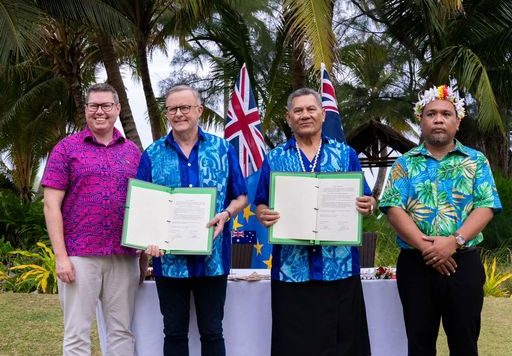The results of Tuvalu’s weekend election have shockingly resulted in former Prime Minister Kausea Natano failing to secure enough votes among the 6,000 registered voters in eight constituencies.
Pacific Media Network’s Tuvalu show producer Fala Haulagi says the desire for a new PM could be due to Natano’s support of the Falepili Treaty.
But she says another reason could be Tuvaluans wanting a youthful shake-up of Parliament.
“From what I’ve been hearing is [Natano] is old and it’s about time he steps aside to mentor the young people,” Haulagi says.
She says however that the results do not take away from Natano being a “wise, respected and humble man” who has done a lot of good for Tuvalu.
“His son was keen to stand, so that could be another reason. Maybe they decided to bring people in.”
Tuvalu have elected six new MPs with 10 returning MP’s to fill Parliament’s sixteen-member roster.
The successful MPs will be taken to Funafuti to be sworn in and elect a new Prime Minister and Speaker for Parliament.
While the controversial Falepili Treaty may have led to Natano’s electoral loss, Tuvalu’s current Minister of Finance is another who could ensure its survival.
Minister Seve Paeniu says the pact is about “dignified migration,” not a loss of sovereignty.
Paeniu, who represents Nukulaelae, says the agreement with Australia is an ideal framework for Tuvaluan migrants, especially those forced to move due to climate change.
“We have known for decades the problems facing our migrants, particularly for those migrating to New Zealand,” Paeniu told Pacific Mornings’ Levi Matautia-Morgan last week.
“They end up struggling in terms of access to social benefits and job protection.
“So, one major element of [the treaty] is to ensure a dignified migration of our people to Australia so that they can enjoy and benefit from whatever Australia can offer.”
He says the treaty safeguards Tuvalu’s sovereignty rather than cause its loss through three obligations Australia must adhere to.
“In times of a natural disaster, health pandemic or a military aggression the treaty provides an opportunity [for Australia] to work with and support Tuvalu to deal with those emergency situations.”
Paeniu also reiterates that the treaty is a direct way to address the impacts of climate change.
“Australia is obligated to support and assist Tuvalu to address the effects of climate change and sea level rise.
“We’re working with the Australian government to provide more land reclamation to protect from coastal erosion and also provide more land space and dwelling of a people.”
Paeniu could also be a strong candidate to be the next Prime Minister, and when speaking on 531pi last week, he said the cost of living will also need to be a priority.
“[Inflation] has been an external shock to our small economy,” Paeniu says.
He says inflation for Tuvalu is determined by international market forces which therefore is unmanageable at a local level.
“Since Tuvalu’s a small open economy we get the result of whatever prices are offered in the market.”
Paeniu says uplifting healthcare, education and infrastructure are key focus areas for him. He also says climate change will remain at the “top of the agenda”.
“All in all, our government which has governed over the last four years has attempted to address many of these concerns.
“But these are lingering issues and will need to be addressed by the incoming government.”
Haulagi says some people believe Paeniu is fit to be Tuvalu’s next Prime Minister due to his governmental skillset and experience.
She says she would like more women in government as among the independent candidates Dr Puakene Boreham, who was the only female candidate, failed to secure enough votes for an MP role.
Haulagi says the new government needs to look into encouraging women leaders to become politicians.
“Only then our voices will be heard as woman at that level.
“It’s like they always say: ‘If you’re not at the table you’ll be on the menu.’ “That’s my word of encouragement to the sisters back home in Tuvalu,” she said.
